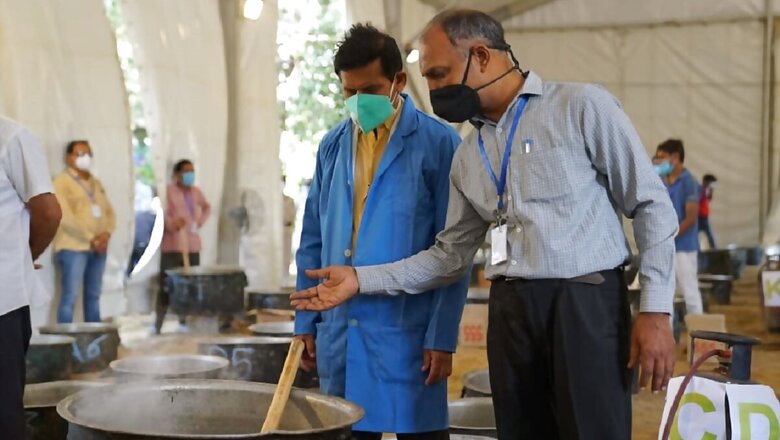
views
At the Kharkhari Nahar village in the South Delhi district, agricultural extension officers of the Delhi government under the guidance of Indian Agricultural Research Institute (IARI) scientists are hard at work in a makeshift tent, methodically preparing a mixture that, when sprayed over crop residue, will decompose the stalks and stubble, etc, in approximately twenty days and also leave the fields more fertile than before. The setup looks very much like the provisional kitchens that spring up during weddings – large flat-bottomed pots and containers, large ladles, cardboard boxes containing ingredients, many smaller stoves, many cooks and the bustle of utensils and people. What is cooking here is a possible solution to the stubble burning that has plagued farmers for decades and compounded the challenge of air pollution across the national capital and northern India.
At the heart of this promising breakthrough in the search of a cheap and viable alternative to stubble burning is the Pusa bio-decomposer capsule. The department of biotechnology in the IARI has been carrying out experiments over the past five years. The head of the microbiology division, Dr K Annapurna, credits her team but particularly Dr Loveleen Shukla for the breakthrough. “It is the research experimental result of the scientists of my division. Dr Loveleen Shukla who is the inventor of the capsule decomposer technology, and we have been working on this particular aspect for the past five years, and for the past one and a half to two years, we have come up with this decomposer capsule technology which we have validated for the past two years in different farmers’ fields in Punjab and Haryana,” says Dr Annapurna.
The technology has been validated only after field trials in Punjab and these would continue, she says. “The science behind this is that this decomposer capsule is a microbial consortium of fungi; all these fungi are capable of producing enzymes which will be hydrolysing the various components in the plant cells like the lignins, celluloses and hemicelluloses,” she explains.
Farmers are compelled to burn their crop residue primarily to clear their fields on time for the next sowing season. Dr Annapurna points out that this bio-decomposer would reduce the time for the crop residue to decompose. ‘’I would say that by and large the decomposition process is very slow if you do not use this kind of a microbial consortium. With this consortium, we have seen that the decomposition process takes place in about 25 days in in situ in the field conditions and the good points I would highlight is, it is able to release the nutrients trapped in the plant cell and thereby the soil is improved in its nutrient status and also it will be helpful in reducing the air pollution,” she says.
Dinesh Kumar, an agricultural extension officer, who is behind one of the large flat-bottom cooking pots, says that 20,000 litres of the bio-decomposer solution would be prepared. Each pot has twenty five litres of water to which 750 grams of jaggery is added and boiled. After removing the film of waste formed at the top and when the temperature of the jaggery-water is normal, 250 grams of besan and twenty capsules of the Pusa bio-decomposer is added. This mixture is covered with a cloth and left for four days for the fungi to be formed. This is then mixed with another twenty five litres of jaggery water and left for three days after which it is ready to be used in the fields. Ten litres of this bio-decomposer mix that has been prepared will be added to 200 litres of water and then sprayed in the fields. Dinesh Kumar says that in the South West district alone, 404 farmers have expressed an interest in this already.
Delhi environment minister Gopal Rai says, “Our officials are going from door to door, speaking to people, getting forms filled…So far the response has been good. Hope that this will be successful…In the past days when we met union environment minister and environment ministers of neighbouring states, we had appealed to them…that if other states adopt this, one can get freedom from problems that arise due to stubble burning.” Rai also points out that this is a far cheaper alternative to the subsidy that was given by the central government to wean away farmers from setting their crop residue on fire. In Delhi, only 40 farmers had come forward to avail the approximately 3 crore rupees subsidy that was provided by the central government.
Cheap, multiple benefits, viability and the additional attraction of turning the decomposed stubble into manure: the Pusa decomposer capsule comes with huge expectations. Chief minister Arvind Kejriwal is taking the technology to the fields and is certainly banking on this to succeed precisely because of these factors. And though stubble burning within the capital is insignificant, the government hopes to provide a solution that works. At the Kharkhari Nahar village, Kejriwal said, “From the 11th onwards, we will begin spraying this solution in the fields…In Delhi, in 700 hectares, the entire cost including that of preparing the solution, spraying it in the fields and transportation is just 20 lakh rupees. If this is successful, this will provide a solution to farmers in neighbouring states also…If it is successful we will do it every year.”




















Comments
0 comment